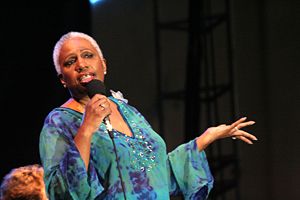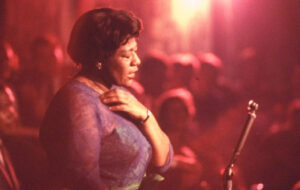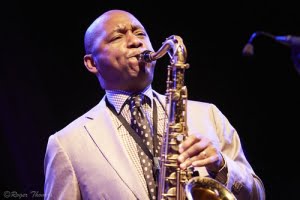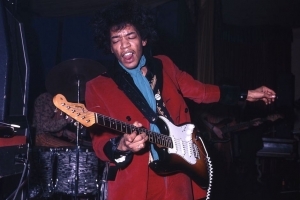The front page of today’s Baltimore Sun carries an excellent obituary for the singer Ethel Ennis, described in its headline as that city’s “First Lady of Jazz.” Which of course she was.
As a performer, a regional celebrity, a venue proprietor and a community builder, she bolstered Charm City’s underrated scene with a genial brand of strength and pride.
Ennis died at home in Northwest Baltimore on Sunday morning, at 86. Her husband of 51 years, Earl Arnett, confirmed her death today; he says she had suffered four strokes over the past two years, including one in December, from which she didn’t recover.
“Ethel was born on the third floor of a rowhouse, and she died on the second floor of a rowhouse,” adds Arnett, a former feature writer and critic for the Sun. “You can’t be much more Baltimorean than that.”
Beyond her legacy within the city, however, Ennis garnered a reputation as a vocal-jazz aficionado’s secret: an unsung character in jazz history, and a walking memoir.
There was the summer run she shared with the Miles Davis/John Coltrane/Cannonball Adderley sextet at the Village Vanguard in 1958. And the NBC-TV performance that matched her with Duke Ellington’s orchestra in 1965. And the time in ’58 that she and Jimmy Rushing gigged winningly with the Benny Goodman band in Brussels. And fruitful encounters with the likes of Cab Calloway, Louis Armstrong and Count Basie. “Singers like Sarah Vaughan and Ella Fitzgerald admired her,” Arnett recalls. “I was in their presence when they said that. They considered her a peer. But she stayed out of that world.”
Born in Baltimore on Nov. 28, 1932, Ethel Llewellyn Ennis began playing piano while in grade school and was performing around town by her mid-teens. Her “singing happened by accident,” Arnett says — and as the story goes, she premiered her vocal gifts only to sate an audience request. (The instrumental foundation proved a coup for Ennis throughout her career, enabling her to lead bands more effectively and quickly earn her accompanists’ respect.)
For a decade beginning in the mid-’50s, she made vital contributions to what we now consider a heyday for vocal-jazz and traditional pop recordings, on labels including Jubilee, Atco, Capitol and RCA Victor.
To hear some of these LPs for the first time — and you can with ease, as a healthy chunk of her catalog can be streamed — is to be gracefully, soothingly awestruck. On her 1955 debut for Jubilee, Lullabies for Losers, with peerless accompanists like Hank Jones, Kenny Clarke and a Neal Hefti-conducted orchestra, her voice is equally robust and elegant, blues-soaked and airy. (As Arnett told the Sun, Billie Holiday dug the album and called Ennis in the middle of the night to say so.)
But more impressively and curiously, Ennis’ singing seems as familiar as it is distinctive. Sarah Vaughan is a good touchstone, but Ennis’ texture is less sandy. Ella is another fine baseline, though Fitzgerald’s presence feels fuller. Ennis can evoke Peggy Lee, sans most of the latter’s sultry theatrics; that comparison, too, wilts under close listening. In her magnificent clarity and directness, the Baltimore hero can call to mind Cannonball-era Nancy Wilson. But not overly so.
Although she appreciated this heady period, Ennis liked her later CDs better, Arnett admits. As evidenced on recordings like 1998’s If Women Ruled the World, where she immerses herself in interactive small-group postbop, she retained her abilities and allowed them to evolve. Her last concert took place in 2016.
Ennis and Arnett, who is white, were married in 1967 — a transitional year with regard to miscegenation laws in Maryland. Their ceremony took place in a courthouse in Aspen, Colo., with a club owner giving the bride away and musicians acting as witnesses.
In addition to Arnett, Ennis is survived by her brother — saxophonist Andy Ennis, a veteran of Ray Charles’ band who led it for a time — as well as nieces, nephews and cousins.
RCA Victor promoted Ennis heavily in the ’60s, Arnett says, but a breakout national hit never came. Not that Ennis was gunning for one. “All she said she wanted to do was respect her talent,” he recalls. “She didn’t want to abuse it.” Part of her savvy included the realization that the music business thrives on politics and exploitation, and that professional success didn’t equate to happiness. “She had real integrity,” Arnett says.
“People used to tell her, ‘Ethel, you’ll never make much money, but you’ll go down in history,’” he adds, chuckling.
Still, unqualified triumphs followed. In 1973 her career surged after her profoundly influential performance of the national anthem at President Nixon’s inauguration. Her rendition — slowed-down and a cappella, with a soulful undertow — came about via a high-profile fan, former Maryland Governor and Vice President Ted Agnew.
As John S. Wilson detailed in The New York Times, Agnew’s office requested she sing at a state department dinner emceed by Frank Sinatra and featuring Danny Thomas. “Afterward, Mr. Agnew invited all three entertainers to his apartment where he pulled out Miss Ennis’s recording of ‘Falling Leaves’ and asked her to sing it while he accompanied her on the piano,” Wilson wrote. (“I’d gotten all this notoriety with the Republican party,” Ennis quips in the piece, “and here I am a registered Democrat.”)
Agnew then asked her to sing the Baltimore-rooted anthem at the ’72 Republican National Convention, which led to the inauguration ceremony. Without the customary backing of the United States Marine Band, Ennis helped to create a template for the anthem whose stark, emotive splendor has endured — less a jingoistic celebration than a thoughtful meditation on American history and ideals.
Another apex occurred during the mid-to-late 1980s, when Ennis and Arnett operated Ethel’s Place, a music venue located near the Meyerhoff, home of the Baltimore Symphony Orchestra. Though the project faltered commercially, the couple was able to foster Baltimore’s jazz community and attract A-list bookings, no doubt a testament to Ennis’ stature. Along with an enviable regular schedule, the club hosted national PBS broadcasts. At one of those, Arnett recalls, Ennis impressed Gerry Mulligan with a spot-on Billie Holiday impression during “Lover Man.” (He also notes that the band featured Ray Brown on bass and Toots Thielemans on harmonica. Not bad.)
“Everybody came through Ethel’s Place,” remembers Cyrus Chestnut, the brilliant pianist who first performed with Ennis in a big band in the early ’80s, and later shared intimate duo concerts with her. “It was special.”
As was its namesake. “She knew [jazz and blues] culture; she was the culture,” Chestnut says. “She didn’t have to study it — she was there when the culture was being put together.”







More Stories
The moment of truth at Ella Fitzgerald’s concert 58 years ago… Video, Photos
Branford Marsalis has become increasingly sought after as a featured soloist with acclaimed orchestras: Video
Honoring the timeless legacy of Jimi Hendrix through powerful performances and charged guitar mastery!: Photos